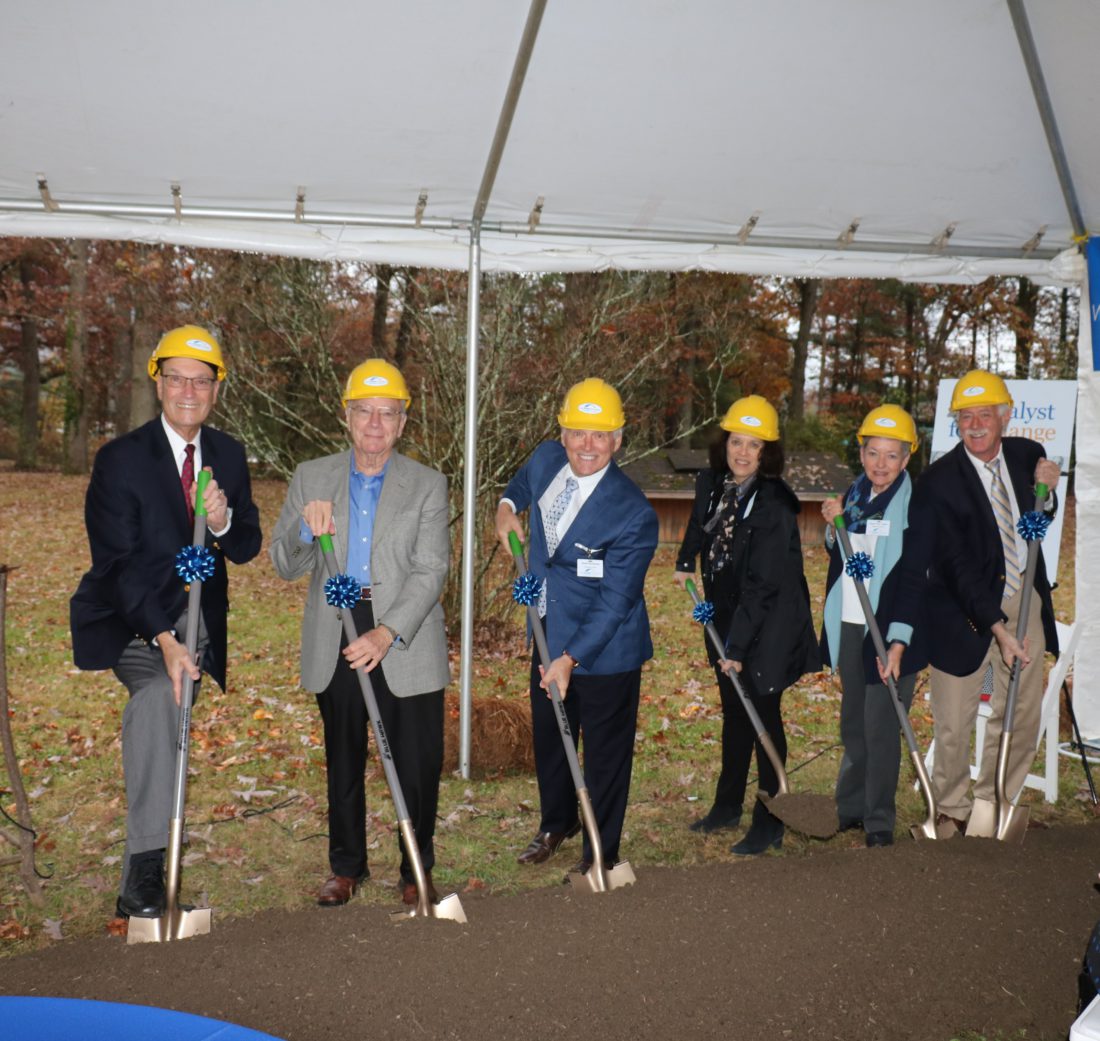“There is nothing wrong in change … if it is in the right direction.” — Winston Churchill
Change is a fact of life for the many nonprofits pursuing charitable missions in Western North Carolina. Behind the scenes, dedicated teams are busy trying to mold the forces of change into positive outcomes against a backdrop of constantly shifting needs.
When the time comes, then, for a new leader or a new strategic direction, nonprofits recognize that those decisions have a big impact on an organization’s ability to drive positive change in the community. That’s why Mountain Xpress took a look at a spectrum of local nonprofits that have recently experienced significant changes or are in the midst of transformative shifts in management or focus.
And when things are changing, a great big bag of money sure helps smooth the process, so it’s pertinent to note some of the recent large infusions of funding to local nonprofits.
Who’s at the helm
In August, Asheville Humane Society announced that Jody Evans will serve as its new executive director. She joined the organization after more than 20 years in nonprofit radio, holding positions from journalist to CEO.
Jessica Whitehill, the former director of philanthropy for Our VOICE, was named executive director of Jewish Family Services of WNC in July. The same month, the Asheville Jewish Community Center hired Ashley Lasher, who was the CEO of the Literacy Council of Buncombe County for over six years, as its new executive director.
Likewise, the Literacy Council welcomed a new executive director in early October: Cindy Threlkeld. She moved to the area in 2011 to take the commensurate position at MANNA FoodBank.
After Asheville Area Arts Council’s past executive director left last winter to take a position at the N.C. Glass Center, the council undertook a search and found Katie Cornell, who was previously the development director for the Center for Craft and has been working in the Asheville arts sector for 18 years.
After conducting a search, Asheville City Schools Foundation appointed one of its own as executive director in June. Asheville High School alumna Copland Rudolph assumed the leadership position after serving as the foundation’s development director since 2017.
Also in June, the board of directors of Western North Carolina Community Health Services, a.k.a. Minnie Jones Health Center, named Kim Wagenaar as permanent CEO following her service in the interim role.
Some local nonprofits remain in the market for leaders:
- Big Brothers Big Sisters of Western North Carolina’s executive director of 27 years, Robin Myer, announced this summer that he will retire in May; the organization is undertaking a nationwide search.
- On Nov. 8, Pardee UNC Health Care in Hendersonville announced that Kim Hinkelman, executive director of Pardee Hospital Foundation, will retire at the end of December after eight years in the role.
- Four Seasons Compassion for Life Foundation has posted a job description for an executive director.
- Green Opportunities announced it had found a new executive director but after a miscue, the organization is back on the hunt.
- United Way of Transylvania County CEO Louis E. Negrón, announced his plans to relocate and tendered his resignation in September; the organization’s board appointed board member Rick Houck to be the interim executive during a search for a permanent replacement.
- Eblen Charities and Southern Appalachian Wilderness Stewards are operating under interim leadership.
The proceeds of the sale of the area’s former largest nonprofit, Mission Health, to for-profit Hospital Corporation of America, created the area’s now-largest nonprofit, Dogwood Health Trust. The newly created nonprofit foundation’s board comprises former Mission Health leaders and community stalwarts from across WNC. DHT hired its first CEO, Antony Chiang, who most recently served as president of the Empire Health Foundation in Spokane, Wash.
Prior to its shift to for-profit status, Mission Health committed up to $15 million to the former Mission Health System foundations. Those entities have transformed into six different organizations that now serve to bolster the social determinants of health in their home communities rather than supporting individual health care facilities. The Nantahala Health Foundation, Pisgah Health Foundation, WNC Bridge Foundation, Highlands Cashiers Health Foundation, Gateway Wellness Foundation and AMY Wellness Foundation, which serve various constituencies in Western North Carolina, also chose boards and, in some cases, executive directors this year. The organizations tend to have working boards and small numbers of staff members.
Lori Bailey, the executive for Nantahala Health, comes from the health nonprofit world, working in mental illness and disabilities, as well as child welfare. When Transylvania Regional Hospital Foundation became Pisgah Health Foundation, its top executive, Lex Green, stayed on. Likewise for Robin Tindall at Highlands Cashiers Health Foundation and the CEO of Asheville-based WNC Bridge Foundation, Scott Buchanan. Luke Howe, who had been a fundraiser for Mission Health foundations, is now serving as the executive director of both the Gateway Wellness and AMY Wellness foundations.
Big money
Dogwood Health Trust is expected to begin awarding $50 million or more per year to nonprofits and government initiatives. The foundation has committed $25 million to the state over five years to battle addiction and reduce overdose deaths, and it announced its first funding opportunity for local nonprofits on Nov. 5. DHT’s Leverage Fund will pay for the services of professional grant writers to help WNC nonprofits pursue grant opportunities of $100,000 or more with the potential to improve health outcomes for the region’s residents.

Other foundations that formed or evolved from the Mission foundations have hit the ground running, doling out funds to a variety of area nonprofits this year.
In October, WNC Bridge Foundation announced $3.3 million in grants to 44 local nonprofits working in three focus areas: emergency wellness, elder care and youth development. The largest grant of $500,000 was awarded to Asheville Buncombe Community Christian Ministry’s Medical Ministry and will provide operational support to expand access to medical and dental care, which the organization provides at no charge to patients.
Meanwhile, Pisgah Health Foundation awarded $6 million, AMY Wellness Foundation awarded $2.5 million and Highlands Cashiers Health Foundation awarded $1.3 million. Those grants went to well over 100 organizations in 14 counties. Nantahala Health Foundation and Gateway Wellness Foundation have not announced the awards for their first funding cycles.
After more than 10 years of advocacy for the creation of a greenway along an inactive rail corridor running between Kanuga Road in Hendersonville and Brevard, Conserving Carolina got a sizable boost to its support for the Ecusta Trail project in August. The N.C. Department of Transportation approved a $6.4 million grant to Conserving Carolina toward the purchase of the corridor, which has been inactive since the Ecusta cigarette paper plant closed in 2002. The organization and its partners must contribute $1.6 million in matching funds.
A Save America’s Treasures grant from the National Park Service was awarded to the Asheville Art Museum in October. The award of $196,935 will be used to support the conservation of the museum’s Black Mountain College collection.
Asheville Greenworks received $100,000 from the Duke Energy Foundation in July for its Love our Trees campaign. The grant will support education, training neighborhood tree keepers, launching a public relations campaign on the benefits and care of urban trees, strengthening the Treasured Trees program and spring and fall events to give away 800 trees to Asheville residents. The foundation annually provides over $30 million in charitable grants across Duke’s service area.
The North Carolina-based Z. Smith Reynolds Foundation named the YWCA Asheville a grantee on behalf of Asheville’s Racial Justice Coalition in June. The grant provides $150,000 per year for two years.
At the end of its fiscal year, the Community Foundation of Western North Carolina announced that grant distributions for the year reached an all-time high, exceeding $20 million. One of its largest contributions, $120,000 to the Appalachian Sustainable Agriculture Project over three years, is slated to increase direct farmer sales.
In September, CFWNC announced $379,787 in focus area grants to support regional projects in early childhood development, food and farming, and natural and cultural resources, as well as $200,000 over two years for OnTrack WNC’s SECURE Matched Savings program, which will offer approximately 200 low-income people support in establishing emergency savings accounts.
New directions
Asheville Area Habitat for Humanity opened a second ReStore for Buncombe County in Weaverville in August. According to Habitat, each store provides the community with a source for affordable home improvement products while diverting 1,800 tons of usable material from the landfill each year. Proceeds from sales support the organization’s mission to provide affordable housing.
Homeward Bound purchased a neglected multifamily building on Asheville’s Short Michigan Avenue. Now renamed Key Commons, the building will be renovated to provide housing for 14 residents earning below 30% of annual median income and who also have significant case management needs.
Seeing a need to ease the abrupt transition from deployment to civilian life veterans sometimes experience, Ralph Gall founded Veterans Retreat of Asheville in the Riceville community.
Gall, who served in Iraq and Afghanistan, is building a small cabin on property adjoining conservation land for veterans to use upon return to the United States. The tranquility, peacefulness and serenity he says he experienced there “is and was responsible in great part to my continued recovery. I felt compelled to share this with other veterans.” He hopes to serve 50-75 veterans per year in stays lasting three to five days. The cabin, he says, will provide returning vets with a place to “decompress and reconnect.”
Fledgling organizations like Gall’s are not the only ones joining WNC’s thriving not-for-profit community. Firefly Gathering, an established annual four-day event “dedicated to teaching and creating a container for people to come together and learn how to live with the Earth,” according to an announcement, has taken the plunge into nonprofit status to pursue a larger mission with community support.
Warren Wilson College launched two projects that will change the campus landscape. In a departure from its usual traditional farm fare, the institution planted its first industrial hemp crop in July, joining other colleges and universities across the U.S. in researching industrial hemp. The school has also undertaken to restore its streams, which farmers channelized in the 1920s. The project, funded in part by stream mitigation credits purchased by the state government to offset the negative effects of construction of the I-26 Connector project, is intended to dramatically reduce the amount of sediment flowing into the Swannanoa River during heavy rain events.






Before you comment
The comments section is here to provide a platform for civil dialogue on the issues we face together as a local community. Xpress is committed to offering this platform for all voices, but when the tone of the discussion gets nasty or strays off topic, we believe many people choose not to participate. Xpress editors are determined to moderate comments to ensure a constructive interchange is maintained. All comments judged not to be in keeping with the spirit of civil discourse will be removed and repeat violators will be banned. See here for our terms of service. Thank you for being part of this effort to promote respectful discussion.